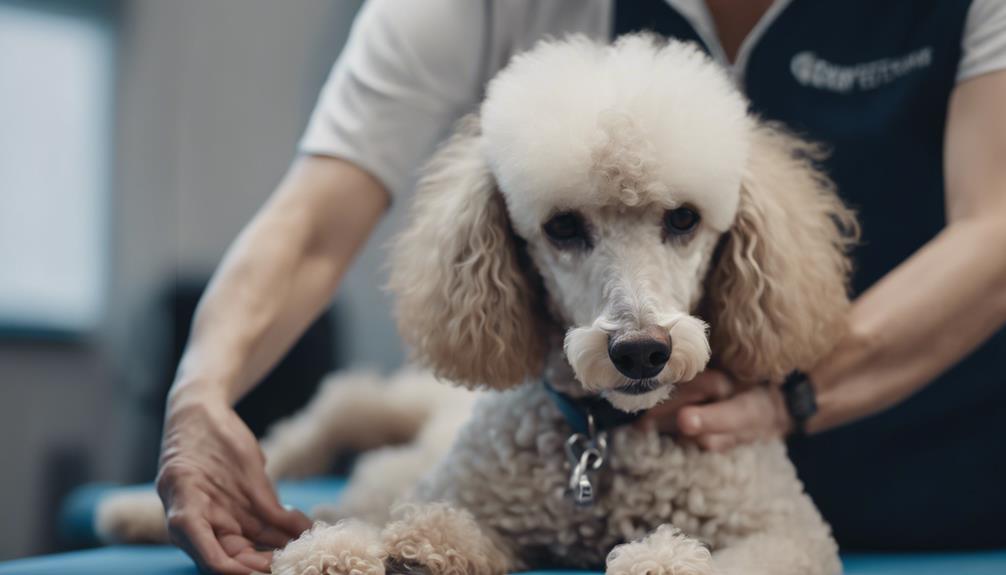If you have a Poodle with special needs, you're not alone; approximately 20% of Poodles may require extra care due to various health conditions or disabilities. Understanding how to cater to their specific needs is crucial for their well-being and happiness. From creating a safe environment to exploring innovative care solutions, there are many ways to support your special Poodle companion. Whether it's navigating mobility challenges or ensuring their emotional wellness, every aspect of care plays a vital role in enhancing their quality of life.
Key Takeaways
- Tailored care plans are crucial for special needs Poodles' well-being.
- Regular monitoring and veterinary care are essential for managing health conditions promptly.
- Specialized grooming and hygiene practices significantly impact a special Poodle's comfort and health.
- Thoughtful use of mobility aids and tailored exercises can support special needs Poodles' mobility and overall well-being.
Understanding Poodle's Special Needs
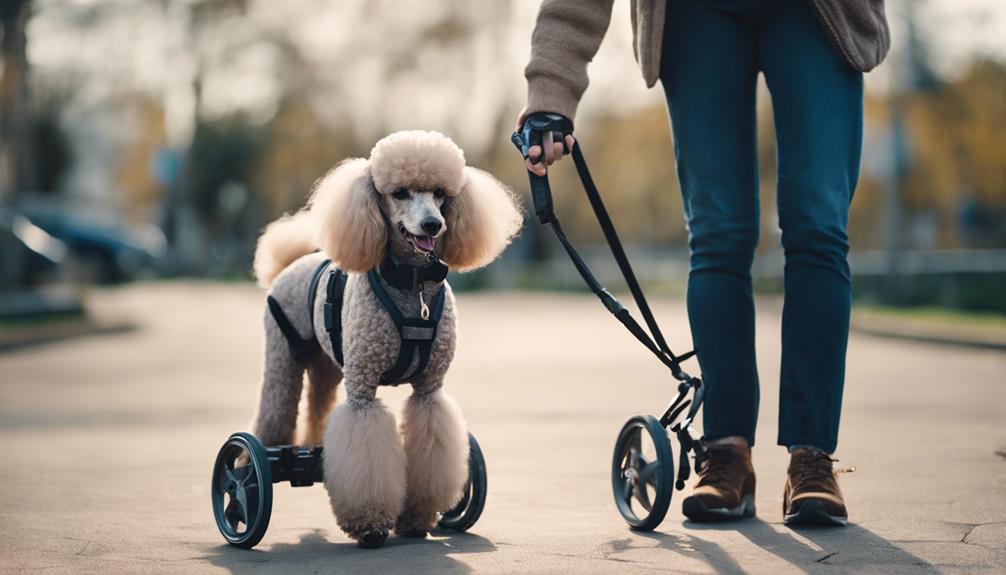
Do you know what makes understanding a Poodle's special needs so crucial for their well-being and care? Poodles with health conditions like hip dysplasia or eye problems require unique care to ensure they thrive. Mobility issues can also affect these special needs pets, making it essential to tailor their environment and activities to support their well-being. Regular veterinary care is vital in managing their health conditions and addressing any new concerns promptly.
Paying close attention to specialized grooming and hygiene practices is necessary for Poodles with mobility issues or sensory impairments. These practices not only help maintain their physical health but also contribute to their emotional well-being. Providing a safe and comfortable space for your Poodle to move around and rest is key to supporting their unique needs.
Understanding the specific challenges that come with caring for a Poodle with special needs allows you to provide the best possible care and enhance their quality of life.
Providing Comfort and Support

To ensure the well-being and comfort of a Poodle with special needs, providing tailored solutions that address their unique challenges like mobility issues or chronic conditions is essential. Special needs Poodles often require specific comfort measures to enhance their quality of life. Creating a comfortable environment with soft bedding and implementing pain management techniques can greatly improve their daily living. Regular monitoring of their health, activity levels, and overall well-being is crucial in providing the necessary support for these special Poodles. Consulting with a veterinarian is key to developing personalized care plans that cater to their individual needs. Veterinarians can offer valuable guidance on managing the specific requirements of special needs Poodles, ensuring they receive the best possible care. Supporting their mobility and maintaining proper hygiene practices are vital aspects of promoting their comfort and overall well-being. By offering tailored comfort and support, you can help your special Poodle lead a fulfilling and comfortable life.
Hygiene Care for Special Poodles
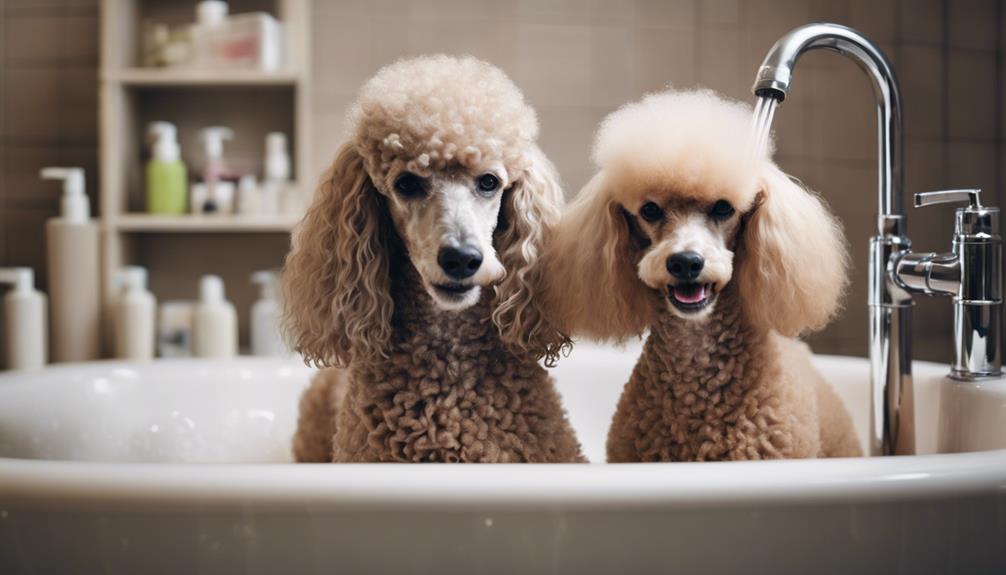
Ensuring proper hygiene care for special Poodles is crucial to their overall health and well-being, especially considering their unique grooming needs and potential mobility challenges. When caring for a dog with special needs, paying extra attention to hygiene can make a significant difference in their comfort and health. Here are three essential tips for maintaining the hygiene of special Poodles:
- Regular Grooming: Special Poodles require regular grooming to prevent matting and skin issues. Brushing their coat daily and using specialized grooming tools can help keep their fur in good condition.
- Assistance with Cleaning: Due to potential mobility challenges, special Poodles may need assistance with cleaning certain areas. Be patient and gentle when helping them stay clean, especially in hard-to-reach spots.
- Consult Professionals: It's advisable to consult a professional groomer or veterinarian for guidance on specific hygiene care routines tailored to your special Poodle's needs. Professionals can offer expert advice on ear cleaning, dental care, and overall grooming practices to ensure your furry friend stays healthy and happy.
Assisting With Mobility Challenges
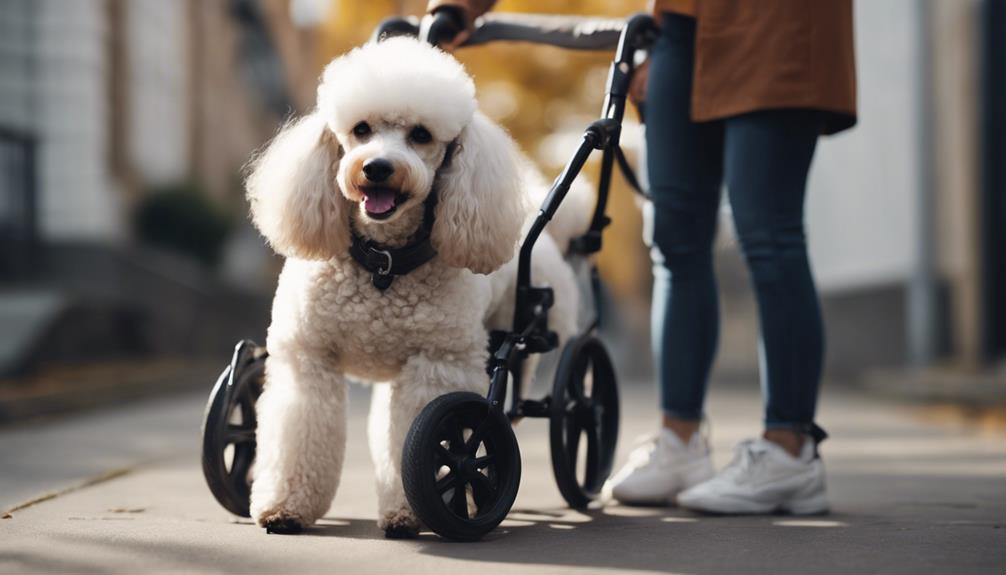
Assistance can be provided to a Poodle facing mobility challenges through the thoughtful utilization of mobility aids and tailored exercise routines. When caring for disabled dogs, it's essential to consider their specific needs and abilities. Pet rehabilitation specialists can offer valuable guidance in creating a personalized plan to address mobility issues. Regular exercise plays a crucial role in maintaining strength and flexibility, even for pets with limited mobility. Specialized training classes can help adapt activities to suit a disabled pet's capabilities. Additionally, mobility aids like dog wheelchairs, harnesses, pet slings, or wraps can provide the necessary support during walks or movement. Consulting with a veterinarian is crucial to ensure the chosen aids and exercises are safe and effective for your furry companion. By combining the expertise of a pet rehabilitation specialist with tailored exercise routines and suitable mobility aids, you can help your pet navigate their mobility challenges with comfort and ease.
| Mobility Aids | Benefits | Considerations |
|---|---|---|
| Dog Wheelchairs | Assist with mobility | Proper fit is crucial |
| Harnesses | Provide support | Training may be necessary |
| Pet Slings/Wraps | Additional assistance | Ensure comfort and stability |
| Tailored Exercises | Maintain strength and flexibility | Adjust intensity as needed |
| Specialized Training | Adapt activities for abilities | Consistency is key |
Harnesses and Mobility Aids
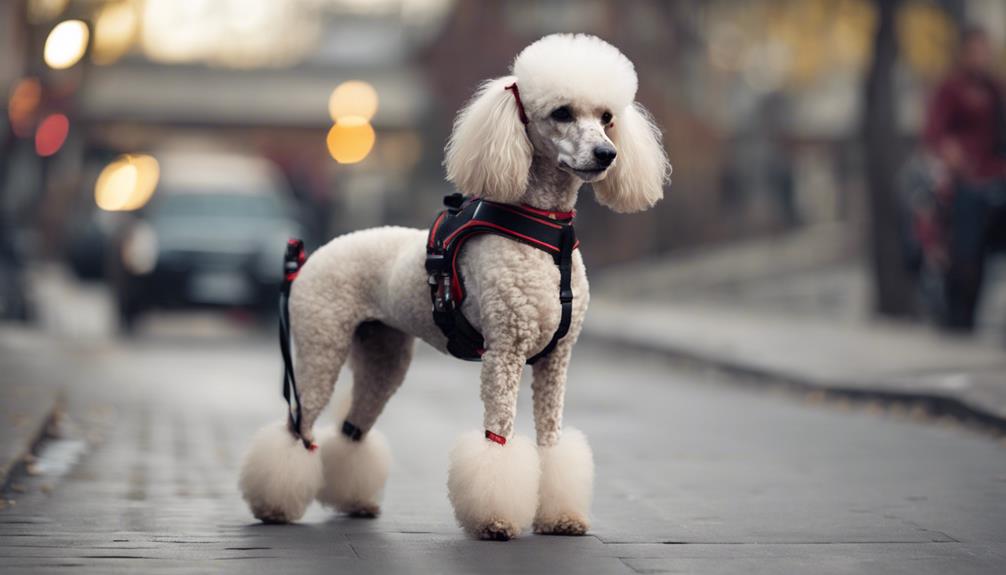
Considering the unique challenges your Poodle may face with mobility, exploring harnesses and mobility aids tailored to their specific needs can greatly enhance their comfort and quality of life. Harnesses designed for poodles with special needs provide crucial support for conditions like arthritis or limb weakness. These harnesses are crafted to distribute weight evenly and prevent strain on your furry friend's body during movement. Customized mobility aids, such as wheelchairs or slings, offer opportunities for poodles to regain independence and move comfortably, promoting physical activity and mental stimulation. These specialized tools not only assist in mobility but also contribute to the overall well-being of poodles with mobility challenges. By investing in the right harness or mobility aid, you can significantly improve your poodle's quality of life, ensuring they can navigate their environment with ease and joy.
Ensuring Quality of Life
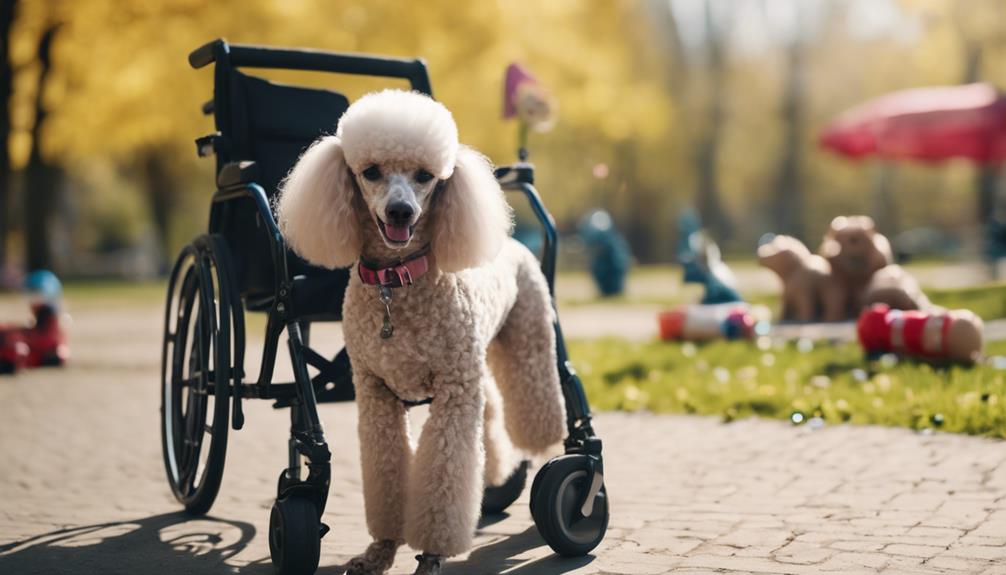
With a focus on personalized care and attention, your special needs Poodle's quality of life can be significantly enhanced. Providing tailored care is crucial in ensuring your Poodle's well-being. Here are some key elements to consider for enhancing your furry friend's quality of life:
| Aspect | Description | Importance |
|---|---|---|
| Tailored Medication | Administering medication specific to your Poodle's needs ensures proper management of health conditions. | Essential |
| Regular Vet Visits | Monitoring your Poodle's health status and adjusting care plans as needed is vital for ongoing support. | Critical |
| Comfortable Environment | Creating a cozy space with proper bedding and support aids can greatly improve your Poodle's comfort. | Enhances Quality |
| Structured Routine | Establishing a routine for exercise, grooming, and hygiene practices ensures your Poodle's overall well-being. | Promotes Health |
| Online Support Groups | Joining communities of caregivers can offer valuable guidance and emotional support in caring for your Poodle. | Emotional Well-being |
Emotional Support for Poodles
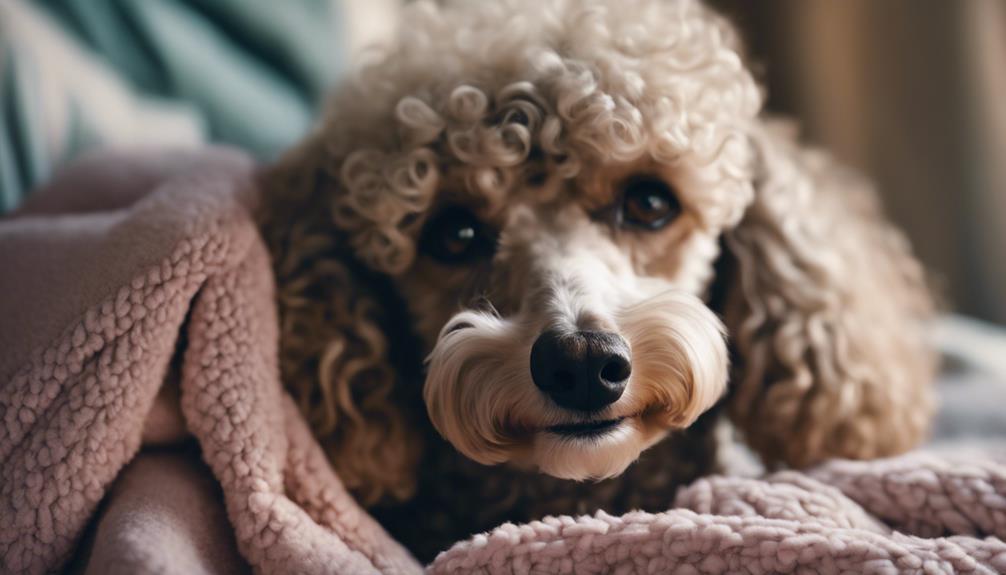
For Poodles with special needs, emotional support plays a vital role in their overall well-being and happiness. These sensitive and intelligent dogs benefit greatly from a nurturing and secure environment where they can thrive emotionally. Here are three key ways to provide emotional support for a Poodle with special needs:
- Understanding Sensitivity: Recognize and respect the emotional sensitivity of your Poodle. Be attentive to their cues and reactions, providing comfort and reassurance when needed.
- Building Confidence and Trust: Offer regular positive reinforcement and encouragement to boost your Poodle's confidence and trust. This can help them feel more secure and develop a stronger bond with you.
- Engaging in Human Interaction: Poodles crave human interaction and form deep connections with their owners. Spending quality time together, engaging in activities, and showing affection can significantly contribute to their emotional well-being.
Special Diet and Nutrition Requirements
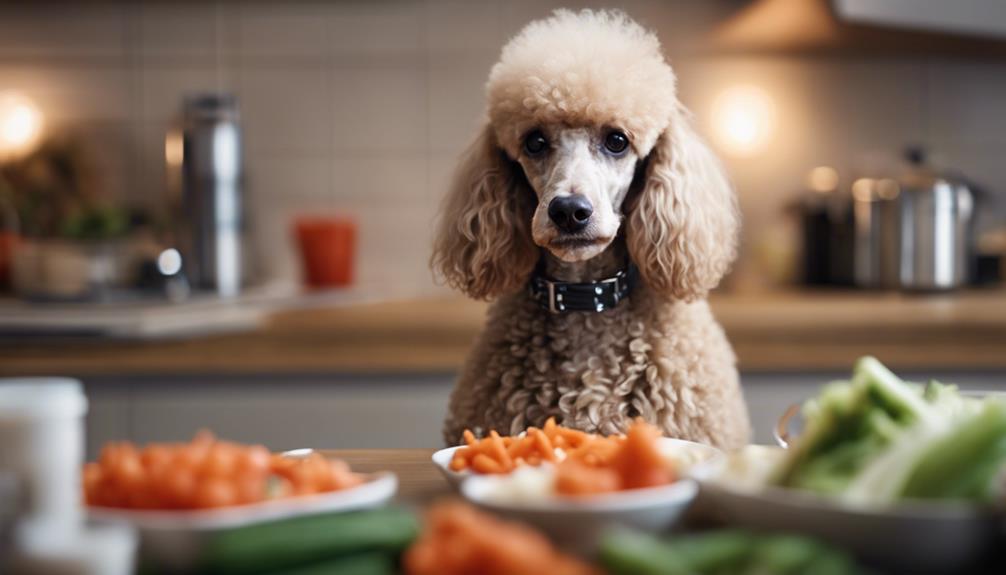
When caring for a poodle with special needs, it's crucial to be mindful of their dietary restrictions and ensure they receive balanced nutrition choices. Working closely with a veterinarian or canine nutritionist can help tailor a diet that meets your poodle's specific health conditions, whether it's allergies, digestive issues, or other concerns. By monitoring their weight, energy levels, and overall health, you can make necessary adjustments to the diet to support their well-being.
Dietary Restrictions for Poodles
Considering your poodle's special needs, tailoring their diet to address specific health conditions is essential for their well-being. When it comes to dietary restrictions for poodles, there are a few crucial considerations to keep in mind:
- Consult Your Veterinarian: Seek professional advice to determine the ideal dietary restrictions and suitable alternatives for your poodle.
- Specialized Formulas: Special diets may include grain-free, hypoallergenic, or limited ingredient formulas to meet your poodle's nutritional requirements.
- Observation and Adjustments: Monitor your poodle's food intake closely for any adverse reactions, enabling you to make necessary dietary adjustments promptly.
Balanced Nutrition Choices
To ensure your special needs Poodle receives the necessary balanced nutrition, tailoring their diet to meet specific health requirements is crucial. Consult with a veterinarian to create a tailored nutrition plan that considers your Poodle's special needs. Dietary supplements can be beneficial in addressing any deficiencies or supporting your Poodle's unique dietary requirements. Opt for high-quality, easily digestible food options to manage digestive issues effectively. Consistency in feeding schedules and portion control is key to managing your Poodle's special dietary needs. By focusing on a balanced diet and a personalized nutrition plan, you can help your special needs Poodle thrive and maintain optimal health.
Frequently Asked Questions
How Do You Deal With a Special Needs Dog?
Dealing with a special needs dog involves using training techniques, providing emotional support, making dietary modifications, establishing exercise routines, and seeking veterinary assistance. Consistency and patience are key to ensuring your dog's well-being.
How Would You Handle an Elderly Animal Who Requires Specialized Care?
You handle an elderly animal needing specialized care by providing mobility aids, a tailored nutrition plan, consistent veterinary support, a suitable exercise routine, and plenty of emotional support. This ensures their comfort, health, and well-being.
What if the Elderly Are Unable to Care for Pets?
When you face challenges caring for pets, options like pet therapy, pet sitters, retirement homes, animal-assisted therapy, and support groups can provide valuable support. Prioritize the well-being of both you and your furry friend.
How Do You Entertain a Disabled Dog?
To entertain a disabled dog, engage with interactive toys, stimulating activities, mental exercises, enrichment games, and physical challenges. Keep them engaged and happy by rotating activities, providing variety, and catering to their specific needs and interests.
Conclusion
As you continue to care for your special needs Poodle, remember that your dedication and love make a world of difference in their quality of life. Did you know that approximately 20% of Poodles develop mobility issues as they age? By providing tailored care, patience, and understanding, you are not only improving their well-being but also strengthening the bond between you and your furry companion. Keep up the great work and always seek support when needed.
